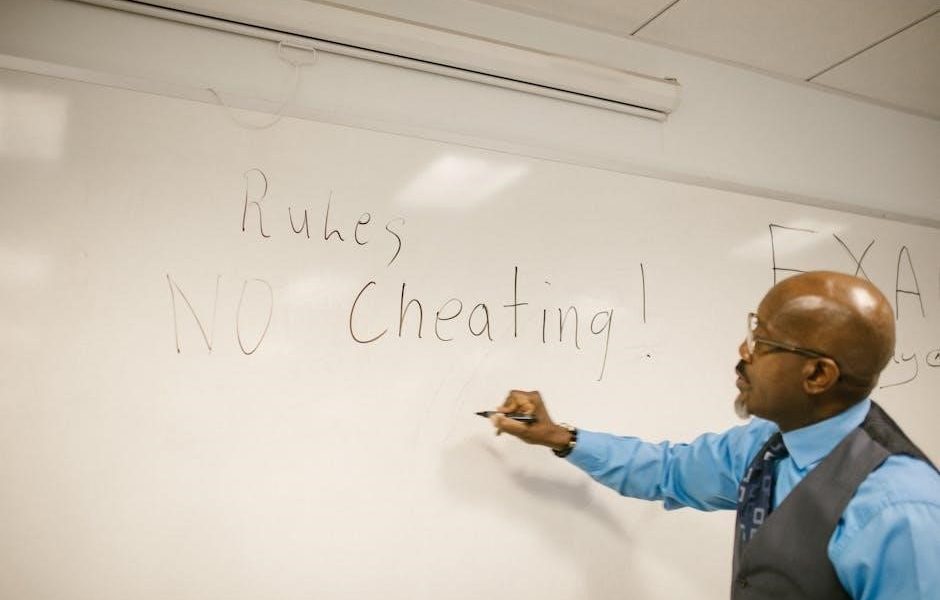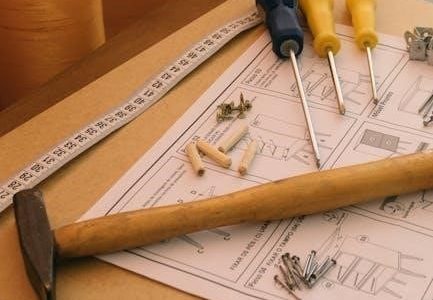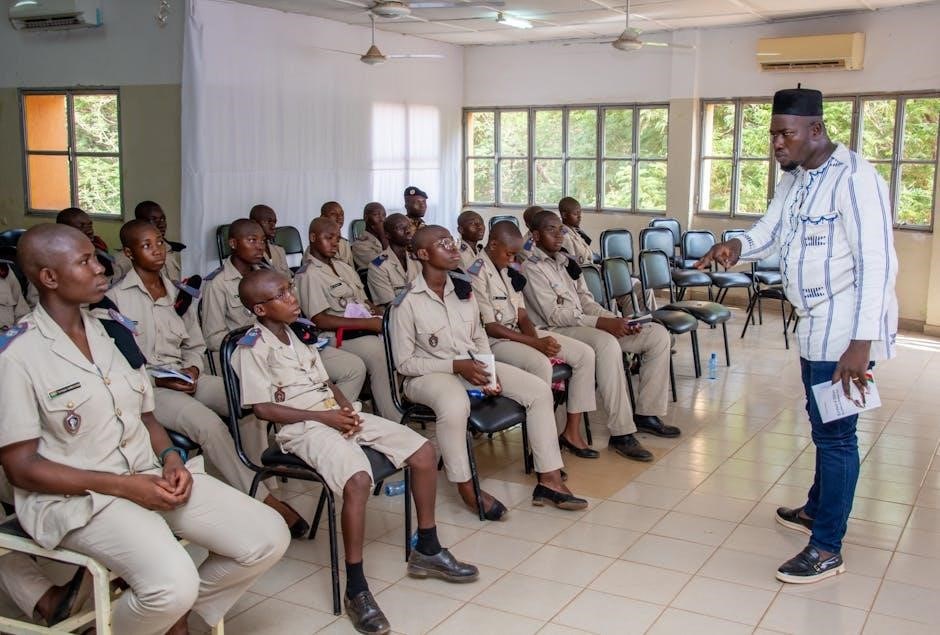
Definition of Formal Education
Formal education refers to structured learning provided by specially trained teachers, following officially recognized policies and curricula, typically within institutional settings, aiming to ensure quality education.
1.1. Formal Education as Structured Learning
Formal education is characterized by structured learning, where specially trained teachers deliver instruction following predefined curricula and policies. This organized approach ensures consistency and coherence in the learning process. It typically occurs in institutional settings, such as schools or universities, with defined schedules and learning objectives. The structured nature of formal education provides students with a clear framework, enabling them to progress systematically through stages of knowledge acquisition. This methodical approach fosters discipline, accountability, and measurable outcomes, making it a cornerstone of modern educational systems worldwide.
1.2. The Role of Specially Trained Teachers
Specially trained teachers play a pivotal role in formal education by delivering instruction based on officially recognized policies and curricula. Their expertise ensures the effective implementation of structured learning programs. These educators undergo rigorous professional development to enhance their teaching skills and adapt to educational standards. They create a disciplined and focused learning environment, fostering student engagement and academic growth. The involvement of specially trained teachers is essential for maintaining the quality and consistency of formal education, making them integral to the educational process and student development.
Characteristics of Formal Education
Formal education is characterized by structured environments, standardized policies, and a defined curriculum, ensuring consistency and quality in the learning process.
2.1. Officially Recognized Policies and Curricula
Formal education adheres to officially recognized policies and curricula, ensuring a standardized approach to teaching and learning. These policies are typically established by educational authorities or governments to maintain consistency and quality across institutions. The curriculum is carefully designed to meet specific learning objectives, often aligned with national or international standards. This structured framework provides a clear roadmap for both teachers and students, ensuring that educational goals are met systematically. Such policies also emphasize accountability and continuous improvement in the educational system.
2.2. Institutionalized Learning Environments
Formal education takes place in institutionalized learning environments, such as schools, colleges, and universities. These structured settings provide organized classrooms, qualified instructors, and access to resources. The environment is designed to support learning, with standardized routines and expectations. Such institutionalized systems ensure consistency and effectiveness in education, preparing students for future challenges. Additionally, these environments facilitate social interaction, teamwork, and extracurricular activities, contributing to holistic development.
2.3. Standardized Assessments and Certifications
Formal education incorporates standardized assessments and certifications to evaluate student progress and knowledge. These assessments, such as exams and tests, ensure consistency in measuring learning outcomes. Certifications, like diplomas or degrees, are awarded upon completion, serving as official recognition of achievement. Standardized systems maintain educational quality and provide credentials that are widely recognized by institutions and employers, facilitating further education and career opportunities while validating acquired skills and knowledge.
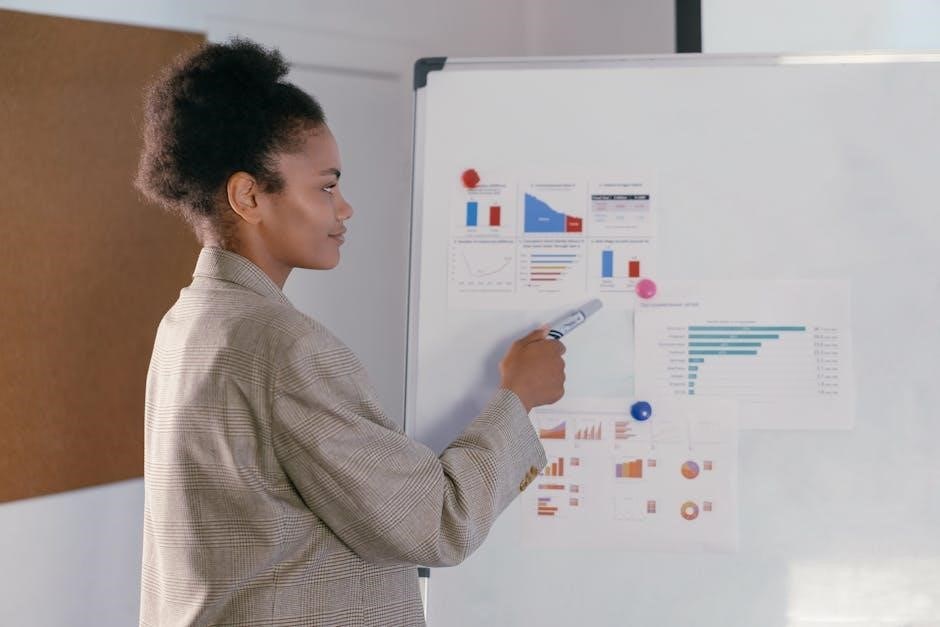
The Role of Specially Trained Teachers
Specially trained teachers provide structured learning, follow recognized policies, and create effective instructional environments, ensuring students receive a high-quality education tailored to their developmental needs.
3;1. Qualifications and Professional Development
Specially trained teachers undergo rigorous qualifications, such as higher education and state examinations, ensuring expertise in their fields. Continuous professional development through workshops, training, and certifications enhances their instructional skills, enabling them to deliver high-quality education effectively. This ongoing process ensures teachers remain updated on educational trends and methodologies, fostering a dynamic and adaptive learning environment. Their qualifications and development directly contribute to the effectiveness of formal education systems, preparing students for future challenges and societal roles.
3.2. Teaching Methods and Instructional Strategies
Specially trained teachers employ diverse teaching methods and instructional strategies tailored to students’ needs. These include interactive activities, hands-on learning, and age-appropriate techniques to engage students effectively. Structured curricula guide their approaches, ensuring alignment with learning objectives. Teachers also adapt strategies to accommodate different learning styles, fostering inclusivity and maximizing student engagement. Their expertise in instructional design enables them to create dynamic lessons, enhancing students’ understanding and retention of material while promoting critical thinking and problem-solving skills.
3.3. Creating a Structured Learning Environment
Specially trained teachers play a crucial role in establishing a structured learning environment, which is fundamental to formal education. They maintain discipline, organize lessons, and ensure adherence to established policies. This structured setting promotes a safe and supportive atmosphere, fostering effective learning. The teachers’ expertise in classroom management and instructional techniques helps students stay focused and motivated, ensuring that educational goals are met systematically. A well-structured environment is essential for achieving standardized learning outcomes and preparing students for future challenges.
Advantages of Formal Education
Formal education offers structured learning, socialization, and access to resources, providing students with comprehensive development and preparation for future opportunities.
4.1. Standardized Learning Outcomes
Standardized learning outcomes ensure consistency in education, allowing students to meet established benchmarks. This uniformity helps in assessing student progress and maintaining educational quality across institutions, fostering accountability and comparability.
4.2. Socialization and Peer Interaction
Formal education fosters socialization through structured interactions among students, promoting collaboration, mutual respect, and cultural understanding. Peer interaction in classrooms enhances communication skills, emotional intelligence, and teamwork, preparing individuals for societal roles and relationships. The diverse student body in formal settings encourages exposure to varied perspectives, fostering inclusivity and adaptability. These social dynamics play a crucial role in personal development, complementing academic learning and contributing to well-rounded individuals capable of contributing positively to society.
4.3. Access to Resources and Facilities
Formal education provides students with access to essential resources such as libraries, laboratories, and technology, enhancing learning experiences. Institutions offer modern facilities, enabling practical training and hands-on activities. These resources are often unavailable in informal settings, giving formal education a distinct advantage in preparing students for future challenges. Access to these tools fosters innovation, critical thinking, and skill development, ensuring students are well-equipped to succeed academically and professionally.
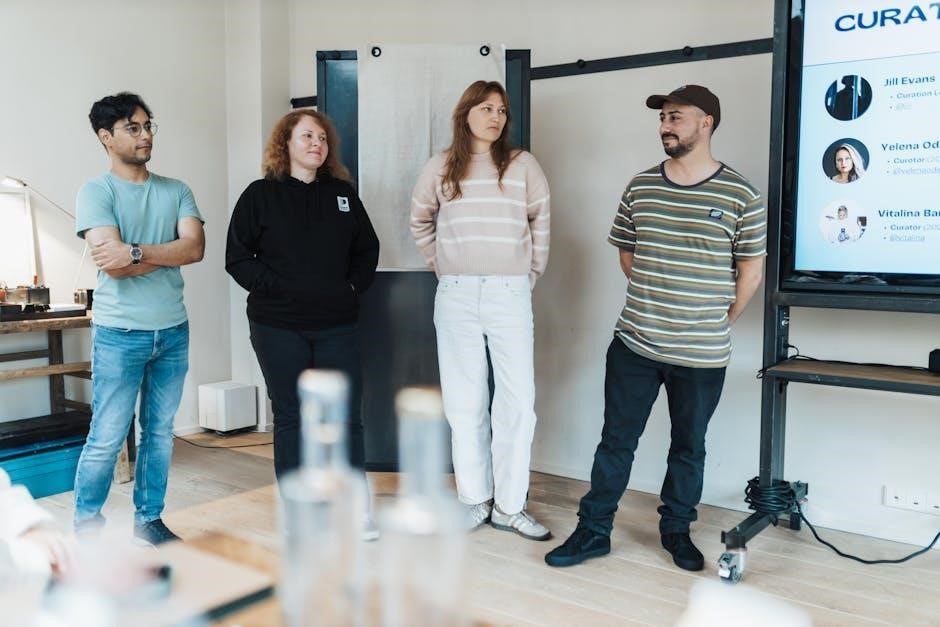
Challenges in Formal Education
Formal education faces challenges such as rigid curriculum structures, limited flexibility for individual needs, and equity issues, affecting accessibility and engagement for diverse student populations.
5.1. Rigid Curriculum Structures
Formal education often struggles with rigid curriculum structures that lack flexibility, making it difficult to adapt to individual student needs or evolving societal demands. These inflexible frameworks can limit creativity and innovation, as they prioritize standardization over personalization. This rigidity can lead to disengagement among students who find the content irrelevant or overly challenging. Additionally, rigid curricula can hinder the integration of new technologies or interdisciplinary approaches, potentially leaving students unprepared for real-world challenges. This inflexibility remains a significant barrier to equitable and effective education.
5.2. Limited Flexibility for Individual Needs
Formal education often struggles to accommodate diverse learning styles and pacing needs due to its standardized nature. Specially trained teachers may face challenges in tailoring instruction for students with unique requirements, as rigid curricula and assessment systems prioritize uniformity. This limitation can hinder personalized growth, particularly for students who require additional support or accelerated learning opportunities. The one-size-fits-all approach often leads to disengagement and unequal learning outcomes, underscoring the need for more adaptable teaching methods to address individual differences effectively.
5.3. Equity and Access Issues
Formal education systems often face challenges in ensuring equity and access for all students. Disparities in resources, socioeconomic status, and geographic location can limit opportunities for marginalized groups. Specially trained teachers are often concentrated in well-funded institutions, leaving under-resourced schools with fewer qualified educators. This creates unequal learning environments and outcomes. Additionally, systemic barriers such as language, culture, and disability further exacerbate these issues, highlighting the need for targeted policies to address these inequities and ensure inclusive access to quality education for all students.
The Importance of Formal Education
Formal education is essential for personal and societal development, equipping individuals with skills, knowledge, and critical thinking to thrive professionally and contribute to their communities effectively.
6.1. Preparation for the Workforce
Formal education equips individuals with the necessary skills, knowledge, and competencies required for the workforce. Through structured learning environments and standardized assessments, students gain foundational understanding and practical skills. Specially trained teachers ensure the delivery of relevant content, preparing learners for professional roles. The curriculum often aligns with industry needs, fostering critical thinking and problem-solving abilities. This systematic approach enables individuals to transition smoothly into the workforce, meeting the demands of employers and contributing effectively to the economy. Formal education thus serves as a bridge between academic learning and real-world application.
6.2. Development of Critical Thinking Skills
Formal education, led by specially trained teachers, fosters critical thinking by encouraging analysis, problem-solving, and independent reasoning. Structured curricula and interactive learning methods promote intellectual growth, enabling students to evaluate information and form well-supported conclusions. This skill development prepares individuals to approach challenges methodically and innovatively, aligning with the demands of a dynamic world. The emphasis on inquiry-based learning and analytical tasks ensures learners are equipped to think critically, a cornerstone for personal and professional success in an ever-evolving society.

6.3. Contribution to Societal Development
Formal education plays a pivotal role in societal development by equipping individuals with knowledge and skills that drive economic growth, innovation, and cultural advancement. Educated individuals contribute to a productive workforce, fostering economic stability and technological progress. Additionally, formal education promotes social cohesion by instilling shared values and civic responsibility, which are essential for a functioning society. It also addresses inequality by providing opportunities for upward mobility, creating a more equitable and inclusive community. Thus, formal education is a cornerstone of societal development, enabling collective progress and sustainability.
Formal education, led by specially trained teachers, is a cornerstone of societal progress. It provides structured learning, ensures standardized outcomes, and equips individuals with critical skills for personal and professional growth. By fostering socialization and access to resources, it bridges gaps and promotes equity. Despite challenges like rigid curricula, formal education remains vital for preparing a skilled workforce and driving societal development. Its impact on individual empowerment and collective advancement underscores its enduring importance in shaping a knowledgeable and capable future generation.
